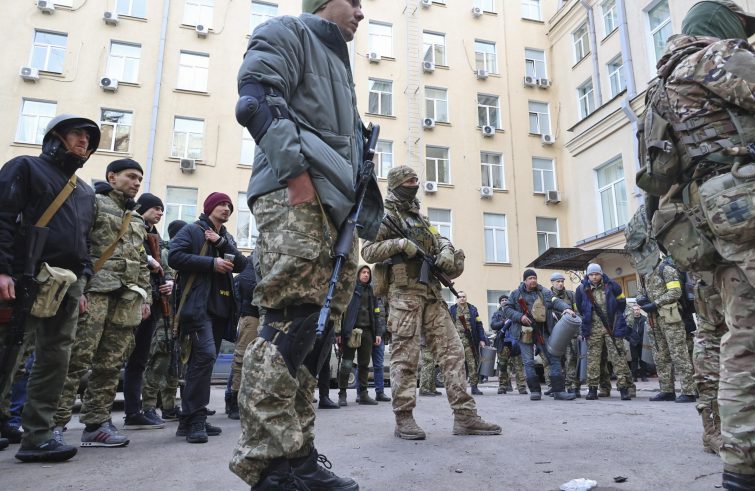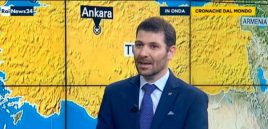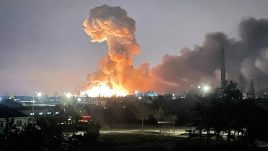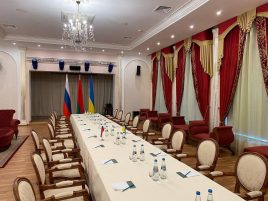
The first round of talks between the Russian and Ukrainian delegations to identify a way out of the days-long conflict ended on Monday evening near the banks of the Pripyat River in the Gomel region of Belarus. No truce or ceasefire agreement was reached, but the parties agreed to meet again in the coming days after consulting their respective governments. Interfax news agency reported statements from the representatives of the Russian delegation: “We have identified certain points on which common positions could be foreseen.” Negotiations with Russia “have not yet delivered the desired outcome for Ukraine”, according to Ukrainian President Volodymyr Zelensky. Ukrainian President’s advisor Mykhailo Podolyak said the “talks were difficult and the Russian position was largely a one-sided one.”
 “The encouraging news – commented to SIR Claudio Bertolotti, expert at the Italian Institute for International Political Studies ISPI, director of Start InSight – is that Russians and Ukrainians will resume talks with a view to gradually ending the crisis. Nevertheless, the fighting is expected to continue until a negotiated solution accepted by both parties is found. We will have to see the extent to which the Ukrainians are willing to compromise and to what lengths the Russians are prepared to go.” In the meantime, adds the expert, “the first two requests have been made: Russia wants Ukraine to recognise Crimea as part of Russia, and President Volodymyr Zelensky’s Ukraine wants to join the EU. It is most likely that the Russian request will materialise. In fact, a favourable response from the EU is unlikely for Ukraine, which, as a country at war, would involve the whole of Europe in the armed conflict. According to Bertolotti, “reassuring Putin that Ukraine will not join NATO could mark a further step forward. We are looking at a negotiation that evidences the strong position favourable to Putin, despite the major economic crisis on the horizon and Russia’s isolation from the international community.”
“The encouraging news – commented to SIR Claudio Bertolotti, expert at the Italian Institute for International Political Studies ISPI, director of Start InSight – is that Russians and Ukrainians will resume talks with a view to gradually ending the crisis. Nevertheless, the fighting is expected to continue until a negotiated solution accepted by both parties is found. We will have to see the extent to which the Ukrainians are willing to compromise and to what lengths the Russians are prepared to go.” In the meantime, adds the expert, “the first two requests have been made: Russia wants Ukraine to recognise Crimea as part of Russia, and President Volodymyr Zelensky’s Ukraine wants to join the EU. It is most likely that the Russian request will materialise. In fact, a favourable response from the EU is unlikely for Ukraine, which, as a country at war, would involve the whole of Europe in the armed conflict. According to Bertolotti, “reassuring Putin that Ukraine will not join NATO could mark a further step forward. We are looking at a negotiation that evidences the strong position favourable to Putin, despite the major economic crisis on the horizon and Russia’s isolation from the international community.”
 This position of strength is also a result of the military campaign which, according to some observers, appears to be proceeding slower than expected. Is that so?
This position of strength is also a result of the military campaign which, according to some observers, appears to be proceeding slower than expected. Is that so?
Contrary to the prevailing narrative in the West, I don’t think that Russia is facing serious difficulties, or, in any case, it hasn’t been in the first few days of the conflict. Russian military doctrine, stemming from Soviet doctrine, albeit somewhat simplified and reorganised today, envisages advancing approximately 30km per day across a ‘medium resistance’ range. Russian troops advanced much further: on the first day alone they penetrated 80-100 km into Ukrainian territory. On the other hand, Ukraine has not been employing the fighting technique known as ‘dynamic contrast’. It did not retreat in combat, but waited – in well-organised defence strongholds – for the Russian army. The latter were hampered by some Ukrainian front-line units without being slowed down much. As regards the invasion of urban areas, it should be remembered that Russian doctrine does not envisage their conquest, at least with the kind of troops deployed in Ukraine. The claim whereby Russian troops were stopped at the gates of the cities is incorrect. Russia’s target was to encircle the towns and destroy not so much the Ukrainian defence system as the morale of the Ukrainian defence forces with a view to their capitulation.
Tanks were deployed in the Russian attack on Ukraine. They hadn’t been seen in years…
That’s right. It was the first time since 1945 that armoured fighting vehicles were deployed on the battlefield in a conflict between States, between national armies. This brings us back to Cold War scenarios, with the advance of the armoured troops of the then Warsaw Pact into the European territories. Today, the land covered by the tanks’ tracks is Ukrainian soil. But this does not surprise me since this kind of military occupation could not have happened otherwise. Most of the conflicts of the last few years have been asymmetrical, with heavy and light infantry confronting insurgent groups. Now military forces are pitted against military forces. For the first time since 1945.
These tactics succeeded in encouraging the Ukrainians to negotiate …
Today we can safely say that Ukraine is open to dialogue based on its participation in the talks in Belarus. However, as it became clear yesterday, negotiations were not over on the first day. Negotiations in Afghanistan lasted 10 years. At this stage, it appears that Ukraine is attempting to reach a negotiated solution in order to avoid the collapse of its defence system. In fact, the Ukrainian army lacks a strategic background and its military forces are mainly deployed in defensive strongholds, thus making it impossible for it to launch a ‘dynamic reaction’, i.e. a counter-attack against Russia. Under such circumstances, it would be impossible to drive out the Russian army beyond its borders. On the opposite front, Russia’s domestic position is starting to deteriorate. Putin no longer enjoys a high degree of consensus amongst his inner circle and amongst the financial oligarchy that supports him – the latter being hesitantly critical of his actions. This might represent a preliminary warning sign that could persuade the Russian president to scale down his initial ambitions without renouncing the opportunity to benefit from this war and use it to his advantage for domestic politics.
 What could be a realistic outcome of the Gomel talks?
What could be a realistic outcome of the Gomel talks?
I suspect that the Ukrainian government will be called to pay the highest price. Putin intends to conquer a large part of eastern Ukraine, extending beyond the Dnepr River, which forms a natural border. While it is unlikely that Putin will succeed in this, he may well be capable of extending his influence far beyond the existing borders of the two self-proclaimed pro-Russian republics of the Donbas region he has recognised, Donetsk and Luhansk, and far beyond Crimea. As things stand today, there are two possible scenarios: the creation of a homogeneous crescent under Russian control from Crimea all the way to the north, as far as Belarus. The other scenario is transferring the Ukrainian government to the area on the other side of the Dnepr River, thereby de facto limiting its authority to just one part of the country. I would exclude a partition of the Ukraine, as this would not be accepted at international level. At stake is also the creation of a pro-Russian Ukrainian government. In that case the question is to what extent the international community will be willing to back Zelensky, who might be sacrificed for the stability of the area.
Vladimir Putin has ordered his military to put Russia’s nuclear deterrence forces on high alert. What impact might this decision have on the talks and the continuation of the fighting? Also NATO has nuclear weaponry….
Putin has reignited the notion and the fear of a nuclear conflict. In a situation of equality, with the enemy also possessing nuclear weapons, a nuclear weapon is a weapon of deterrence. According to military doctrines, the obvious consequence is retaliation, i.e. a deliberate response by the adversary. In my opinion, it is very unlikely, I would say impossible, that nuclear warheads will be deployed. I consider it to be a threat raised by Putin, prior to the negotiations with the Ukraine, to bring two powerful items to the negotiating table – the physical presence of the Russian Army on Ukrainian territory and the stage of siege imposed on its most important cities along with the threat of using nukes to suppress all resistance and restrict the inclusion of third parties, such as NATO. This atomic bogeyman does not worry the parties supporting Ukraine, as stated by NATO Secretary General Jens Stoltenberg.
How do you see China at this stage: a missing player, or the elephant in the room?
I think that China is playing its cards right by monitoring the global response to the unilateral actions of a major power, Russia against Ukraine today, China against Taiwan tomorrow. Its closeness to Russia, combined with commercial cooperation, strengthens an ever stronger alliance – not so much for the benefit of Russia as for that of China itself. In a potential US-China confrontation, having the backing of Russia is an advantage for China. Xi Jinping’s country has no intention of getting involved, yet it still ensures support for Russia.
Who could play the role of mediator?
Israel has good relations with Ukraine and Russia. An estimated one million Russian Jews have left for Israel in the last 50 years. Ukrainian President Zelensky is Jewish. Furthermore, it is no coincidence that three weeks ago Israel cleverly avoided responding to Ukraine’s request for anti-missile systems (Iron Dome). In doing so, it did not take sides, thereby remaining equidistant enough to sit at the negotiating table as a mediator. If it happens, it would be a great move.












